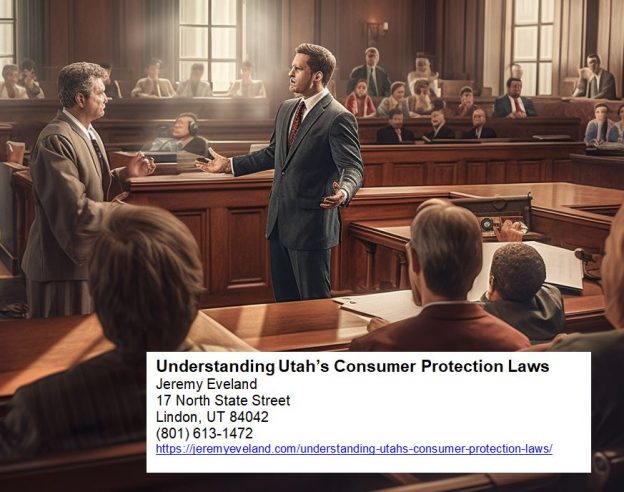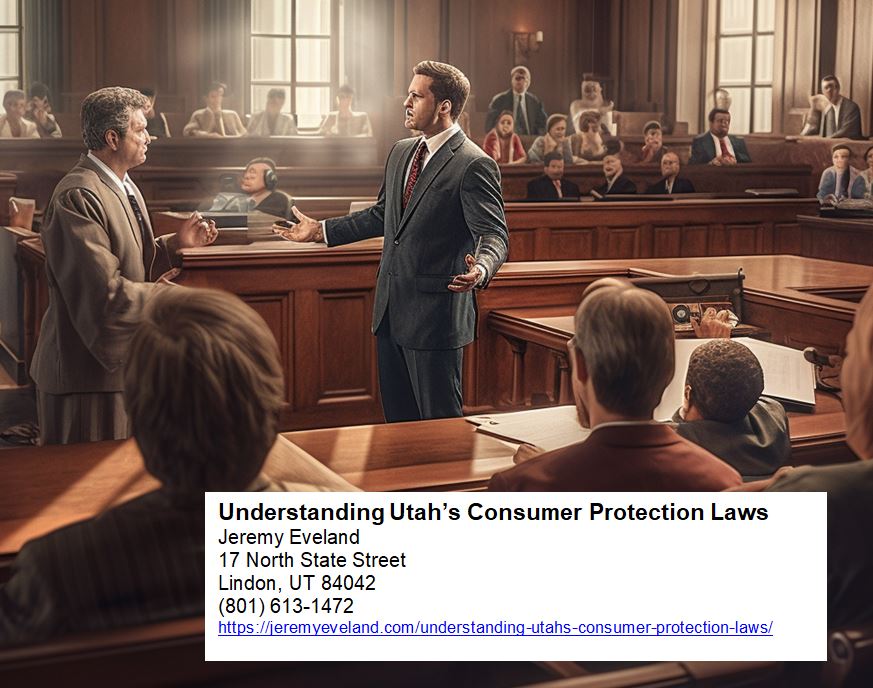Introduction
Understanding Utah’s consumer protection laws is essential for any business operating in the state. These laws are designed to protect consumers from unfair or deceptive practices, and to ensure that businesses are held accountable for their actions. This guide will provide an overview of the key consumer protection laws in Utah, including the Utah Consumer Sales Practices Act, the Utah Unfair Practices Act, and the Utah Deceptive Trade Practices Act. It will also discuss the enforcement of these laws, and the remedies available to consumers who have been harmed by a business’s violation of these laws. Finally, it will provide resources for further information and assistance.
What Are the Rights of Consumers Under Utah’s Consumer Protection Laws?
Under Utah’s consumer protection laws, consumers have the right to be informed about the products and services they purchase. Consumers have the right to be provided with accurate information about the quality, quantity, and price of goods and services. Consumers also have the right to be protected from deceptive and unfair practices, such as false advertising, bait-and-switch tactics, and other deceptive practices.
Consumers have the right to seek redress if they have been harmed by a business’s deceptive or unfair practices. Consumers may file a complaint with the Utah Division of Consumer Protection or seek legal action in court.
Consumers also have the right to be informed about their rights under the law. The Utah Division of Consumer Protection provides information about consumer rights and how to file a complaint.
Finally, consumers have the right to be informed about their rights under the law. The Utah Division of Consumer Protection provides information about consumer rights and how to file a complaint. Consumers also have the right to be informed about their rights under the Fair Credit Reporting Act, which protects consumers from inaccurate or incomplete credit reports.
How Can Consumers File a Complaint with the Utah Division of Consumer Protection?
Consumers in Utah can file a complaint with the Utah Division of Consumer Protection (DCP) by submitting a complaint form online or by mail.
To file a complaint online, consumers should visit the DCP website and click on the “File a Complaint” link. This will take them to the complaint form, which they should fill out completely and accurately. Once the form is submitted, the DCP will review the complaint and contact the consumer if additional information is needed.
Consumers can also file a complaint by mail. To do so, they should download the complaint form from the DCP website and fill it out completely and accurately. The form should then be mailed to the DCP at the following address:
Utah Division of Consumer Protection
160 East 300 South, 2nd Floor
Salt Lake City, UT 84111
Once the DCP receives the complaint, they will review it and contact the consumer if additional information is needed.
It is important to note that the DCP cannot provide legal advice or represent consumers in court. However, they can provide information and resources to help consumers resolve their complaints.
What Are the Penalties for Violating Utah’s Consumer Protection Laws?
Violations of Utah’s consumer protection laws can result in both civil and criminal penalties.
Civil Penalties:
The Utah Consumer Sales Practices Act (CSPA) allows for civil penalties of up to $10,000 per violation. The Utah Division of Consumer Protection (DCP) may also seek an injunction to stop the unlawful practice, restitution for consumers, and/or the payment of attorney fees.
Criminal Penalties:
The CSPA also provides for criminal penalties for violations. A person who knowingly and willfully violates the CSPA may be guilty of a class B misdemeanor, punishable by up to six months in jail and/or a fine of up to $1,000. If the violation is found to be intentional and malicious, the person may be guilty of a third-degree felony, punishable by up to five years in prison and/or a fine of up to $5,000.
In addition, the Utah False Advertising Act (FAA) provides for criminal penalties for violations. A person who knowingly and willfully violates the FAA may be guilty of a class B misdemeanor, punishable by up to six months in jail and/or a fine of up to $1,000. If the violation is found to be intentional and malicious, the person may be guilty of a third-degree felony, punishable by up to five years in prison and/or a fine of up to $5,000.
It is important to note that the DCP may also refer cases to the Utah Attorney General’s Office for criminal prosecution.
How Can Consumers Protect Themselves from Unfair Business Practices in Utah?
Consumers in Utah can protect themselves from unfair business practices by taking the following steps:
1. Research the business: Before engaging in any transaction with a business, it is important to research the company and its practices. Consumers should look for reviews and complaints online, as well as contact the Better Business Bureau to see if any complaints have been filed against the business.
2. Read contracts carefully: Before signing any contracts, consumers should read them carefully and make sure they understand all of the terms and conditions. If there is anything that is unclear, consumers should ask questions and get clarification before signing.
3. Know your rights: Consumers should familiarize themselves with their rights under Utah law. This includes the right to cancel certain contracts within three days of signing, the right to receive a refund if goods or services are not delivered as promised, and the right to dispute charges on their credit card.
4. Report unfair practices: If a consumer believes they have been the victim of an unfair business practice, they should report it to the Utah Division of Consumer Protection. The division can investigate the complaint and take action if necessary.
By taking these steps, consumers in Utah can protect themselves from unfair business practices.
What Are the Key Provisions of Utah’s Consumer Protection Laws?
Utah’s consumer protection laws are designed to protect consumers from unfair or deceptive business practices. These laws provide consumers with remedies for damages caused by deceptive or unfair business practices.
The Utah Consumer Sales Practices Act (CSPA) is the primary consumer protection law in the state. This law prohibits businesses from engaging in deceptive or unfair practices when selling goods or services to consumers. It also provides consumers with remedies for damages caused by deceptive or unfair business practices.
The CSPA prohibits businesses from engaging in false advertising, bait-and-switch tactics, and other deceptive practices. It also prohibits businesses from engaging in unfair practices such as charging excessive fees or interest rates, or failing to disclose important information about a product or service.
The CSPA also provides consumers with the right to cancel certain contracts within three days of signing. This includes contracts for home improvement services, health club memberships, and door-to-door sales.
The Utah Consumer Protection Act (UCPA) is another important consumer protection law in the state. This law prohibits businesses from engaging in deceptive or unfair practices when collecting debts from consumers. It also provides consumers with remedies for damages caused by deceptive or unfair debt collection practices.
The UCPA prohibits debt collectors from engaging in harassing or abusive behavior, making false or misleading statements, or using unfair or unconscionable means to collect a debt. It also requires debt collectors to provide consumers with certain information about the debt, such as the amount owed and the name of the original creditor.
Finally, the Utah Unfair Practices Act (UUPA) prohibits businesses from engaging in unfair or deceptive practices when selling goods or services to consumers. This law provides consumers with remedies for damages caused by deceptive or unfair business practices.
The UUPA prohibits businesses from engaging in false advertising, bait-and-switch tactics, and other deceptive practices. It also prohibits businesses from engaging in unfair practices such as charging excessive fees or interest rates, or failing to disclose important information about a product or service.
Overall, Utah’s consumer protection laws are designed to protect consumers from unfair or deceptive business practices. These laws provide consumers with remedies for damages caused by deceptive or unfair business practices.
Areas We Serve
We serve individuals and businesses in the following locations:
Salt Lake City Utah
West Valley City Utah
Provo Utah
West Jordan Utah
Orem Utah
Sandy Utah
Ogden Utah
St. George Utah
Layton Utah
South Jordan Utah
Lehi Utah
Millcreek Utah
Taylorsville Utah
Logan Utah
Murray Utah
Draper Utah
Bountiful Utah
Riverton Utah
Herriman Utah
Spanish Fork Utah
Roy Utah
Pleasant Grove Utah
Kearns Utah
Tooele Utah
Cottonwood Heights Utah
Midvale Utah
Springville Utah
Eagle Mountain Utah
Cedar City Utah
Kaysville Utah
Clearfield Utah
Holladay Utah
American Fork Utah
Syracuse Utah
Saratoga Springs Utah
Magna Utah
Washington Utah
South Salt Lake Utah
Farmington Utah
Clinton Utah
North Salt Lake Utah
Payson Utah
North Ogden Utah
Brigham City Utah
Highland Utah
Centerville Utah
Hurricane Utah
South Ogden Utah
Heber Utah
West Haven Utah
Bluffdale Utah
Santaquin Utah
Smithfield Utah
Woods Cross Utah
Grantsville Utah
Lindon Utah
North Logan Utah
West Point Utah
Vernal Utah
Alpine Utah
Cedar Hills Utah
Pleasant View Utah
Mapleton Utah
Stansbury Par Utah
Washington Terrace Utah
Riverdale Utah
Hooper Utah
Tremonton Utah
Ivins Utah
Park City Utah
Price Utah
Hyrum Utah
Summit Park Utah
Salem Utah
Richfield Utah
Santa Clara Utah
Providence Utah
South Weber Utah
Vineyard Utah
Ephraim Utah
Roosevelt Utah
Farr West Utah
Plain City Utah
Nibley Utah
Enoch Utah
Harrisville Utah
Snyderville Utah
Fruit Heights Utah
Nephi Utah
White City Utah
West Bountiful Utah
Sunset Utah
Moab Utah
Midway Utah
Perry Utah
Kanab Utah
Hyde Park Utah
Silver Summit Utah
La Verkin Utah
Morgan Utah
Utah Consumer Protection Law Consultation
When you need help from a Utah Consumer Protection Law attorney call Jeremy D. Eveland, MBA, JD (801) 613-1472 for a consultation.
Jeremy Eveland
17 North State Street
Lindon UT 84042
(801) 613-1472
Related Posts
Impact of Environmental Regulations on Business Law Compliance
Business Lawyer South Jordan Utah
Business Lawyer Millcreek Utah
Business Lawyer Taylorsville Utah
How Artificial Intelligence is Shaping the Future of Business Law
Estate Planning is Crucial for People of All Income Levels
Navigating Legal Challenges in Business Succession Planning
Business Lawyer Bountiful Utah
How To Structure A Merger Or Acquisition In Utah
How To Hire Employees Legally in Utah
10 Tips for Negotiating Lease Agreements
Business Lawyer Spanish Fork Utah
How To Start A Non-Profit In Utah
What are the Trademark Laws in Utah
Business Lawyer Pleasant Grove Utah
How to Calculate Overtime Pay in Utah



